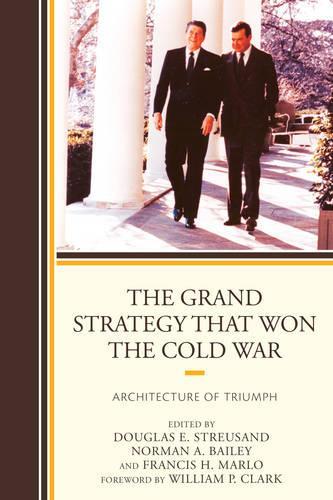
The Grand Strategy that Won the Cold War: Architecture of Triumph
(Paperback)
Available Formats
Publishing Details
The Grand Strategy that Won the Cold War: Architecture of Triumph
By (Author) Douglas E. Streusand
Edited by Norman A. Bailey
Edited by Francis H. Marlo
Foreword by William P. Clark
Contributions by Richard V. Allen
Contributions by Norman A. Bailey
Contributions by Ronald B. Frankum
Contributions by Derek Leebaert
Contributions by John Lenczowski
Contributions by Carnes Lord
Bloomsbury Publishing PLC
Lexington Books
24th July 2017
United States
Classifications
Tertiary Education
Non Fiction
History of the Americas
International relations
327.73047
Physical Properties
Paperback
296
Width 153mm, Height 228mm, Spine 22mm
449g
Description
This book demonstrates that under the leadership of President Ronald Reagan and through the mechanism of his National Security Council staff, the United States developed and executed a comprehensive grand strategy, involving the coordinated use of the diplomatic, informational, military, and economic instruments of national power, and that grand strategy led to the collapse of the Soviet Union. In doing so, it refutes three orthodoxies: that Reagan and his administration deserve little credit for the end of the Cold War, with most of credit going to Mikhail Gorbachev; that Reagans management of the National Security Council staff was singularly inept; and that the United States is incapable of generating and implementing a grand strategy that employs all the instruments of national power and coordinates the work of all executive agencies. The Reagan years were hardly a time of interagency concord, but the National Security Council staff managed the successful implementation of its program nonetheless.
Reviews
This is an excellent and outright indispensable book for understanding the literal strategy of President Ronald Reagan and his administration in attempting to peacefully take down the Soviet Union and win the Cold War. There have been few more just causes, and the accomplishment of that historic mission by Reagan and his staffmany of which are contributors to this volumeis one of the great stories of our time. How did Reagan and his team do it This book lays out the answer. Most important, it does so via direct testimony of those who actually did it. Thanks to this important book, we know the inside story from the actual insiders, rather than some erroneous speculation by distant academics who never got anywhere near the inside or the truth. We owe a great debt of gratitude to Streusand, Bailey, Marlo, and their cast of outstanding contributorsBill Clark, Richard Pipes, Roger Robinson, Richard Allen, John Lenczowski, and othersfor what theyve produced here. This is a must-read and vital point of reference for anyone who wants to understand the grand strategy that secured peaceful victory in the Cold War. You must consult this book to have a complete understanding of that strategy. -- Paul Kengor, Grove City College
This book reveals for the first time the exquisite understanding of theSoviet threat and its weaknesses by President Reaganpersonally and his team based on their faith in America's first, founding principles of human behavior. Their method was toSeek the Truth, and Speak the Truth against the Soviets and their worshipers in the Western intellectual elite who had capitulated to Soviet domination,and tried to emulate Communist solutionsto economic and social problems at home in some cases.Reagan saw the existential evil of andwith clarity the weaknesses of the Soviet Empire, and with a hand picked team of faithful believers, set out to design policy solutions to exploit those weaknesses withan iron will and consistency.Several hundred million people were freed from communist slavery and the first Cold War was decisively won. It is a blueprint for a successful American national security policy. -- Hon. Tidal W. McCoy, Acting Secretary of the Airforce and Sr. Assistant Secretary of the Airforce, 1981-88
Ronald Reagan and his NSC staff devised and implemented a coherent, comprehensive, and consistent grand strategy to hasten the end of the Cold War. That is the simple truth amply demonstrated by this book's authoritative and non-tendentious authors. -- Walter A. McDougall, University of Pennsylvania
Author Bio
Douglas E. Streusand is professor of international relations at the Marine Corps Command and Staff College and adjunct professor at the Institute of World Politics. Norman A. Bailey is professor of economics and national security at the Center for National Security Studies at the University of Haifa and professor of economic statecraft at the Institute of World Politics. He served as President Reagans special assistant for national security and international economic affairs from 1981 to 1984 and in the Office of the Director of National Intelligence in 20062007. Francis H. Marlo is associate professor of international relations at the Marine Corps Command and Staff College.
